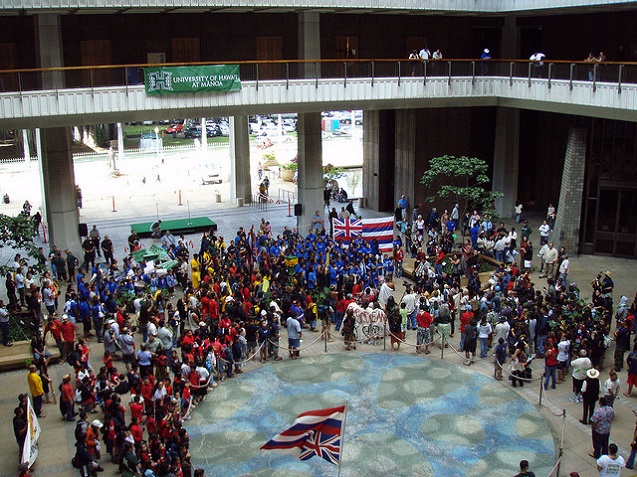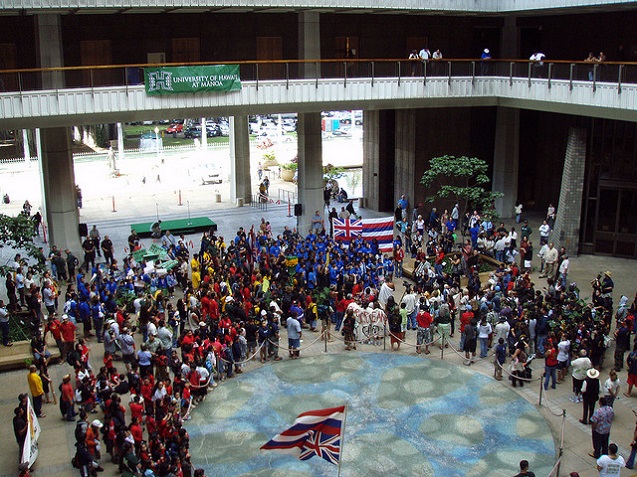
Honest, paywall-free news is rare. Please support our boldly independent journalism with a donation of any size.
 kundalini / Flickr)” width=”637″ height=”477″ />GMO protesters at Hawaii’s capitol (Photo: kundalini / Flickr)
kundalini / Flickr)” width=”637″ height=”477″ />GMO protesters at Hawaii’s capitol (Photo: kundalini / Flickr)
The question facing Hawaiians in their grassroots opposition to GMO development: Do county governments – and the local communities they represent – have the power to regulate global chemical companies and the pesticide-laden process of developing genetically engineered seeds?
The debate over genetically modified organisms (GMOs) in Hawaii is reaching a fever pitch. The battleground has shifted from packed local meetings to a federal court and the Legislature as powerful agrichemical interests push back against a grassroots movement that has succeeded in passing laws through two county councils. The question facing the island state that has become a cradle of GMO development: Do county governments – and the local communities they represent – have the power to regulate global chemical companies and the pesticide-laden process of developing genetically engineered seeds?
After months of massive marches and packed local meetings, two county governments in Hawaii took on Monsanto, DuPont, Syngenta and the other agrichemical firms that take advantage of Hawaii’s three growing seasons to develop GMO seed varieties sold across the world. In November, the county of Kauai passed a law regulating pesticide use at GMO test plots near residential communities. (Truthout reported from Kauai in November, check out our in-depth coverage here and here.) In December, the island of Hawaii banned biotech companies from operating on the island and asked farmers not to plant any newly developed GMO seeds besides papaya.
On January 23, state lawmakers introduced legislation that would block county governments from restricting legal agricultural practices, a move that critics say is a clear effort to pre-empt the counties of Hawaii and Kauai and render their new GMO rules null and void. Anti-GMO activists have dubbed the bill the “Hawaii Monsanto Protection Act.”
During the 2012 election cycle, Monsanto and two lobbyists that represent the company were among the top 15 donors to Sen. Clarence Nishihara, the bill’s main sponsor in the state Senate, according to state records. During the same election year, Sen. Donovan Dela Cruz, another sponsor in the Senate, received a combined $3,650 of donations from Monsanto, Syngenta, DuPont and Dow Chemical and an additional $5,450 from Monsanto lobbyists and industry representatives.
In January 2014, DuPont Pioneer, Syngenta and a subsidiary of Dow Chemical filed a lawsuit in federal court challenging Kauai’s new law, originally called Bill 2491 and now known as Ordinance 960. The law aims at protecting environmental and public health by requiring the three companies, along with the biotech firm BASF, to publically disclose information about pesticide sprays and establishing buffer zones near schools and hospitals.
Corporate Bullying
The lawsuit comes as no surprise. The three companies, which lease more than 11,000 acres on Kauai, had threatened to take legal action during the fiery public debate over Bill 2491 last year. The firms argue that they have been unfairly singled out and are sufficiently regulated by state and federal laws. Kauai County, they told the court, has overstepped its jurisdiction in attempting to infringe on their business.
 An agrichemical facility operated by Dupont Pioneer near an irrigation ditch running out to the ocean on the island of Kauai. (Photo: Mike Ludwig)“For three of the largest of the agrichemical companies in the world to sue a place like Kauai County, a small community, for the right to spray poisons next to schools is indicative of the corporate mindset that we’re dealing with,” said Gary Hooser, a member of the Kauai County Council and the main architect of Bill 2491.
An agrichemical facility operated by Dupont Pioneer near an irrigation ditch running out to the ocean on the island of Kauai. (Photo: Mike Ludwig)“For three of the largest of the agrichemical companies in the world to sue a place like Kauai County, a small community, for the right to spray poisons next to schools is indicative of the corporate mindset that we’re dealing with,” said Gary Hooser, a member of the Kauai County Council and the main architect of Bill 2491.
Hooser said his community is “firm in its resolve.” Attorneys with environmental and food safety groups have vowed to defend the Kauai law pro-bono.
The GMO laws passed on Hawaii and Kauai are the results of a grassroots push on county governments to limit biotech operations. Some supporters of the laws are hardcore anti-GMO activists who surely would kick Monsanto and friends out of the state if given the chance, but others, like those living in the shadow of GMO test plots on Kauai’s west side, where thousands of pounds of restricted-use pesticides are sprayed each year, say they simply want to protect public health.
“As a west-side resident who is surrounded by the test fields of these companies, it is my basic human right to know what they are exposing me and my family to on a regular basis,” said local activist Malia Chun after the companies filed suit against Kauai County. “Their actions prove that they do not value the health and well-being of our community and are only interested in their corporate profit.”
In their complaint against Kauai County, the agrichemical companies argue that disclosing their pesticide regimens would force them to reveal “trade secrets” and put them at risk of “commercial espionage.” Chun and other residents, however, want to know if the chemicals are harming the environment and contributing to an uptick in birth defects in an area where dust from the GMO fields regularly falls on neighborhoods and irrigation ditches run directly into a local river and the ocean.
 A residential neighborhood on the island of Kauai’s west end is just across the river from GMO testing fields where restricted use pesticides are sprayed on a regular basis. (Photo: Mike Ludwig)Some of the restricted-use pesticides, such as atrazine, sprayed near Chun’s neighborhood of mostly native Hawaiians, have been linked to health problems and are banned in European countries. Federal law in the United States simply requires them to be applied by licensed professionals. In the past, local schoolteachers said that overspraying by Syngenta caused a general panic at an elementary school and made several children sick. The company has denied any wrongdoing.
A residential neighborhood on the island of Kauai’s west end is just across the river from GMO testing fields where restricted use pesticides are sprayed on a regular basis. (Photo: Mike Ludwig)Some of the restricted-use pesticides, such as atrazine, sprayed near Chun’s neighborhood of mostly native Hawaiians, have been linked to health problems and are banned in European countries. Federal law in the United States simply requires them to be applied by licensed professionals. In the past, local schoolteachers said that overspraying by Syngenta caused a general panic at an elementary school and made several children sick. The company has denied any wrongdoing.
Hawaii’s Monsanto Protection Act
A bill introduced in both chambers of the Legislature in late January 2014 signaled that Honolulu is now the epicenter of the state’s GMO debate. The bill amends the Hawaii Right to Farm act to prevent county governments from enacting laws and ordinances that prevent farmers and ranchers from employing “agricultural technology” and farming practices that are allowed under state or federal law.
Democratic Rep. Richard Onishi, vice chairman of the Hawaii House Committee on Agriculture, said in a statement that the bill seeks to strike a balance between “rural and urban needs” and prevent nuisance lawsuits against law-abiding farmers. When asked by a local reporter if the bill is an attempt to pre-empt the GMO measures passed on Hawaii and Kauai, Onishi said, “It’s not about preempting the counties. It’s not about GMOs. It’s about supporting farmers.”
Hooser, a former state lawmaker, is unconvinced. He sponsored the Kauai pesticide law and defended it for months against an aggressive campaign waged by the agrichemical companies.
“Clearly the intent of these bills is to take away the counties’ authority in support of the agrochemical companies agenda of minimizing regulation of their industry,” Hooser told Truthout. “To say otherwise is disingenuous.”
Hawaii state Sen. Russell Ruderman, a Democrat, called the bill a “cynical attempt” to undo the counties’ new GMO laws. He said legislation had to be passed at the county level because the powerful agrichemical companies already have bought out state and federal lawmakers.
“The state Legislature has consistently blocked any effort to regulate pesticides and GMOs,” Ruderman told Truthout.
Nishihara, a Democrat and chairman of the senate’s agricultural committee, introduced the Right to Farm bill in his chamber. Nishihara did not respond to a Truthout request to comment on the bill, but a review of Nishihara’s campaign finance records show that Monsanto was one of the top 15 donors to the senator’s 2012 election campaign, with $1,000 of donations. George Morris and John Radcliffe, who lobby for Monsanto and other corporations, gave Nishihara $1,000 and $1,500, respectively. Alicia Maluafiti, director of the pro-industry Hawaii Crop Improvement Association, donated $1,000 during the 2012 election cycle. Syngenta gave Nishihara $500 that year.
In 2008, the Grocery Manufacturers Association, which has spent big opposing state GMO labeling initiatives, gave Nishihara $4,000. Monsanto donated $750 to the senator’s war chest that year, and Morris and Radcliffe have made donations in the past.
Dela Cruz received $1,500 from Monsanto during the 2012 cycle and an additional $5,000 from Monsanto lobbyists, according to state records. Dow, Dupont and Syngenta also gave donations ranging from $500 to $1,000.
Last year, Dela Cruz introduced legislation that Hooser routinely has touted as evidence that the biotech industry already was lobbying state lawmakers to block counties from regulating the agrichemical industry. Hawaii law states that county governments have the power to enact laws “deemed necessary to protect health, life, and property,” but Dela Cruz’s bill, which was meant to clear up conflicts between federal, state and local regulations, would have struck the words health and life from that language.
“To take away the right of the county to protect health and life really shows what they are willing to do to protect their interests,” Hooser said about Dela Cruz’s legislation, which he sees as a precursor to the Right to Farm bill.
Cruz’s “health and life” bill did enjoy some supporting testimony from a Monsanto community outreach manager but was deferred to committee after many others testified against it. Dela Cruz did not respond to a request for comment from Truthout.
While the “Hawaii Monsanto Protection Act” is making headlines, it’s clear that some Hawaii lawmakers are paying attention to the groundswell of anti-GMO activism in their state. Several bills to require the labeling of groceries containing GMO ingredients are on the docket, including one that would amend the state constitution to do so. Other bills call on the state agriculture department to study the impacts of GMO agriculture and issue harsher penalties for pesticide violations.
One proposal would ban open-air testing of GMO seeds and plants unless the agrichemical companies are granted an exception by proving that their experiments are done in controlled environments. Another bill would place a five-year moratorium on the use of Roundup, the popular herbicide originally patented by Monsanto that many GMO crops are engineered to tolerate. It’s unlikely these bills will make it out of committee. But if they are successful, they could force the agrichemical companies to leave Hawaii. For now, their presence will continue to be a statewide controversy and a flashpoint in the global debate over the future of food.
Speaking against the authoritarian crackdown
In the midst of a nationwide attack on civil liberties, Truthout urgently needs your help.
Journalism is a critical tool in the fight against Trump and his extremist agenda. The right wing knows this — that’s why they’ve taken over many legacy media publications.
But we won’t let truth be replaced by propaganda. As the Trump administration works to silence dissent, please support nonprofit independent journalism. Truthout is almost entirely funded by individual giving, so a one-time or monthly donation goes a long way. Click below to sustain our work.